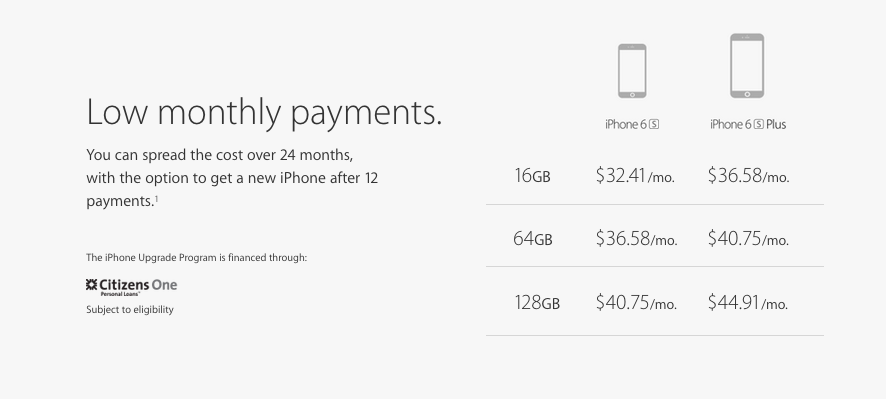Even as Apple's (AAPL 0.93%) product portfolio expands, investors in the Mac maker have to accept that the iPhone remains the sun to Apple's financial solar system. Fortunately, reportedly historic pre-order volume for Apple's new iPhone 6s shows that Apple's primary financial driver remains as strong as ever.
What's more, according to one analyst, a key change to Apple's iPhone buying options could prove a boon to Apple's hundred-billion-dollar line item, possibly making Apple's shares worth as much as $200. Let's take a look.
Inside Apple's installment plan
According to UBS analyst Gareth Jenkins, Apple's new iPhone installment plan could hold the keys to vaulting Apple's stock price to $200 a share. For context, this seemingly bold claim implies that this single change to the iPhone's buying patterns could add roughly 75% upside to Apple's stock at its current levels.
Is this insane or insightful?
For those still unfamiliar, Apple's new iPhone installment plan allows consumers to effectively rent an iPhone from Apple by agreeing to pay a monthly fee over 24 months. The iPhone comes unlocked, allowing users to shop around for the wireless plan that best fits their needs. And when the new iPhone is released annually, Apple will give consumers the option to upgrade to the newer iPhone for free by simply renewing their contract for a fresh 24-month period.

Source: Apple
In comparing per-device revenue, the new installment plans will net Apple slightly more revenue. For example, the 16GB iPhone 6s costs $649 to purchase outright versus costing $678.84 over the 24-month installment plan. The terms of the installment plan also require consumers to purchase AppleCare, which runs at $99.99, so Apple's total collections over the life of the installment plan ($778.84) sit markedly higher than its more traditional ownership model. However, offering a "free" upgrade to the next year's iPhone by simply renewing your contract for a fresh 24 months should help pull forward iPhone sales among consumers who typically wait for at least two years before purchasing a new iPhone.
UBS claims that if 15% of iPhone owners begin purchasing their iPhones through this program, it would add between 3% and 4% to Apple's 2017 EPS. That doesn't necessarily strike me as significant enough of a move to justify a 75% uptick in Apple's stock price, but it's worth nothing that the installment plan carries several important non-financial benefits as well.
First and foremost, Apple will sell iPhones unlocked under its installment plan. In smartphones markets like America, Western Europe and Japan, installment plan sales will now flow through Apple rather than Apple's telecom partners. This gives Apple a more direct relationship with consumers, and by extension diminishes the leverage large telecom companies might have over Apple, a net positive for the company. Additionally, as noted by UBS, tying Apple customers into consistent upgrades of the next year's iPhone would also help smooth its smartphone sales into an almost annuity-like profit stream, which carries a few small-scale benefits (rationalizing Apple's capital structure, clarity for analysts, etc.).
Just another reason to buy Apple
Although its stock has risen about 70% over the past two years, recent weakness in Apple's shares create an opportune entry point for potential investors, especially in light of tailwinds like its installment plan. I'm hugely skeptical that the $200 price target floated by UBS' Jenkins is plausible over the next 12 months. However, it does help reiterate the growing number of tailwinds likely to drive Apple stock higher in the coming years. It's directionally accurate, if you will, especially considering the about-10% pullback in Apple stock we've seen in the past three months.
Beyond the secular iPhone growth story, nearly every one of Apple's product lines should also see growth in the coming quarters. Apple Watch sales should continue to increase going into the holiday season. Although the iPad has struggled for some structural reasons, Apple's introduction of the iPad Pro at its September product launch event should help buoy its tablet division at the very worst. Apple's Macs remain the lone bright spot in an otherwise dreary PC market, although the iPad Pro could begin to cannibalize these sales to a certain extent. And lastly, Apple's recently refreshed Apple TV offers a meaningful improvement over its predecessor, while also setting the stage for key long-term strategic growth drivers as well.
So while the $200 price target might not make sense for Apple, there's still plenty to like about Apple stock today.






